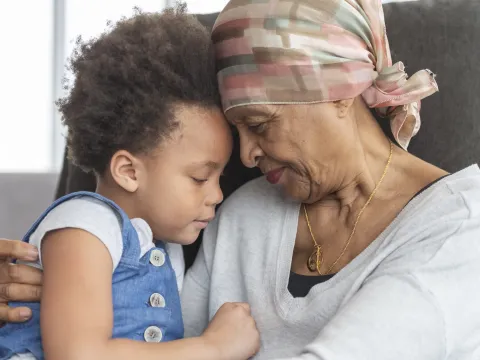- AdventHealth

The journey to overcome cancer takes so much of the human spirit. Harnessing every ounce of courage, completing treatment and transitioning from a cancer patient to a survivor marks the start of another brave journey ahead. This next passage is focused on getting back to feeling your best and being empowered to thrive.
A cancer survivor and gynecologic oncologist at AdventHealth, Nathalie McKenzie, MD, knows a thing or two about life after cancer. Adopting the same philosophy of cancer risk-reduction and a lifestyle of wellness that she prescribes to many people, Dr. McKenzie has a unique perspective to share with each patient she sees.
“While getting the ‘cancer-free’ all-clear scan is a moment for enormous celebration, we want cancer survivors to do everything they can to optimize their overall wellness to reduce the chances of their cancer recurring, and to live full, healthy lives,” Dr. McKenzie explains.
Research — and survivors like Dr. McKenzie — shows that a lifestyle promoting balance in body, mind and spirit can make a big impact on health outcomes.
Current Research: Lifestyle Factors After Cancer
There are about 12 million cancer survivors in the U.S., and with a growing number of early detection methods and promising cancer treatments, this number is expected to rise.
So, how can survivors decrease the risk of cancer recurrence, continue healing and keep optimizing their long-term health?
Lifestyle Factors That Promote Wellness
According to an article published in the Journal of Clinical Oncology, some lifestyle factors could hold the key to improved health outcomes and quality of life among cancer survivors. These include:
- Eating a healthy diet
- Exercising regularly
- Maintaining a healthy body weight
- Stopping or limiting alcohol consumption
- Stopping or limiting smoking
Other key takeaways from this article included:
- People who make positive lifestyle changes after a cancer diagnosis report improved wellness and less fatigue
- Unfavorable lifestyle behaviors like smoking and alcohol consumption are linked to developing some common cancers, and this risk may harm cancer survivors
Dr. McKenzie emphasizes that poor nutrition, unhealthy habits and too much stress can increase a person’s risk for cancer recurrence, so it’s important to evaluate your everyday habits to improve your health in remission.
Aggressive Approaches to Treatment and Survival Are Key
As a cancer survivor, Dr. McKenzie acknowledges that lifestyle changes can be difficult, especially after persevering through a cancer journey.
"I believe in being aggressive about treatment and survival," she says. "My patients are women being treated for some of the most difficult cancers. When they come through to the other side, I want them to feel truly well, and for their lives as cancer survivors to be as abundant as possible."
As research shows and Dr. McKenzie points out, new daily habits are essential to thriving after beating cancer. She offers her tips on how to approach your life ahead with the same pursuit for wellness that supported a win over cancer.
How to Thrive as a Cancer Survivor
Dr. McKenzie recommends making these lifestyle factors the cornerstone of your journey to thrive.
A Healthy Diet
You are what you eat, especially after enduring cancer treatment. Limiting red meat and switching to a predominately plant-based diet with five to nine servings of fruits and vegetables daily, increased beans and whole grains and an overall reduction in fat and salt intake is the way to go.
Exercise Often
You don't have to train for a marathon, just make a point to get moving for a small part of every day. Moderate exercise for 30 minutes each day can make a huge difference in your health.
Stop Smoking
This point may seem obvious, Dr. McKenzie says, but it's really the most important way to boost your health if you smoke. Multiple studies have shown that smoking significantly increases the chances for cancer recurrence, and not just at the site of the original cancer.
Reduce or Stop Drinking Alcohol
Limiting your alcohol intake has numerous health benefits, regardless of whether you’ve had cancer or are in remission. Research also shows that alcohol intake can lead to increased cancer recurrence rates after treatment, so it’s best to avoid alcohol as much as possible.
An Oncology Team You Can Count On
At AdventHealth, Dr. McKenzie is part of a compassionate team of experts who are here to see you through your cancer journey — well before and long after your all-clear scan.
“I tell my patients that I always have my boxing gloves on, fighting for their lives, and the fight doesn't end after surgery or treatment," Dr. McKenzie says. "Every cancer survivor should talk to their doctor about how best to optimize their survival."
If you’ve been diagnosed with cancer recently, or are now taking steps to thrive in remission, we’re here for you. Learn more about the AdventHealth Cancer Institute or contact us today.



